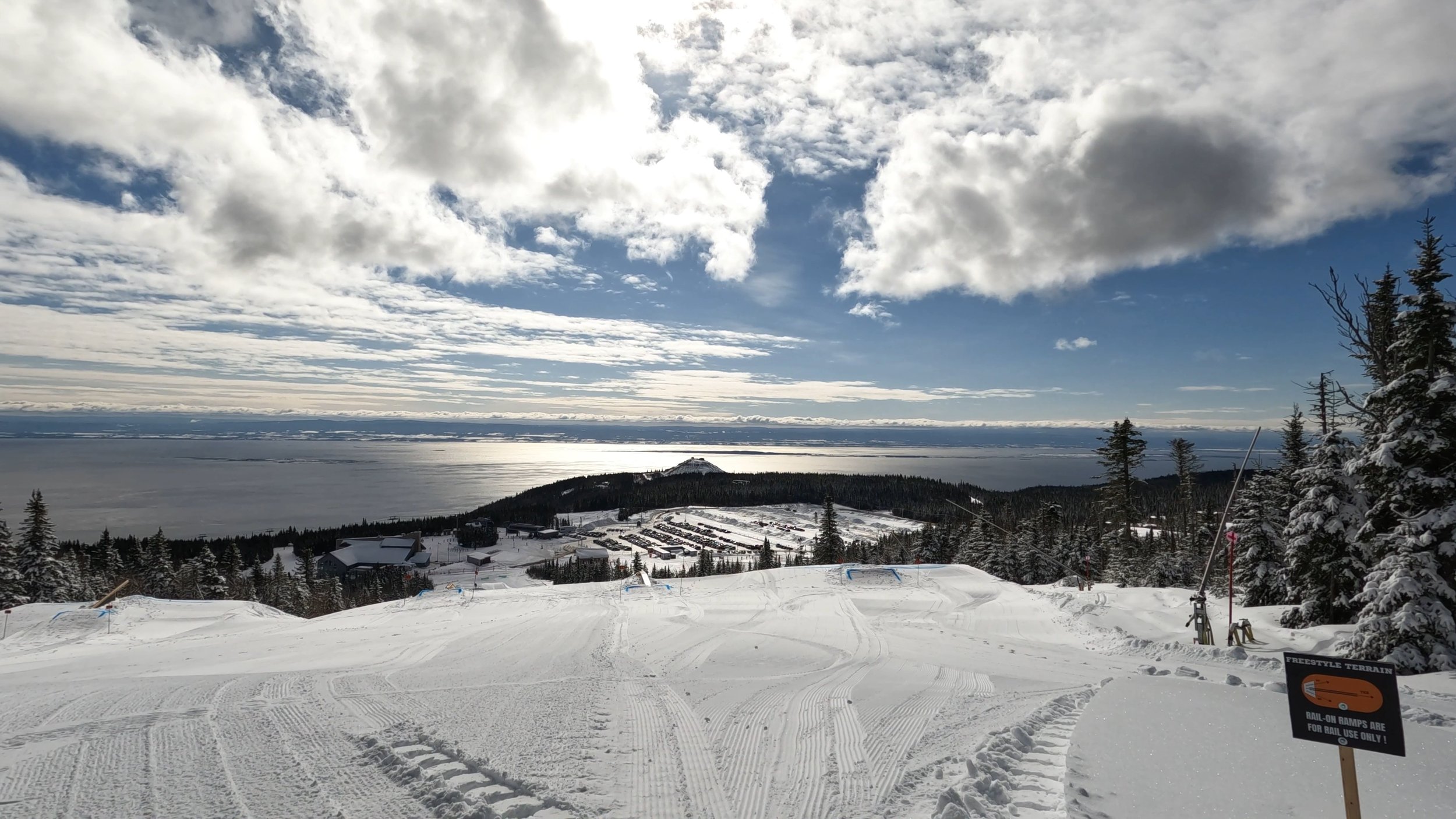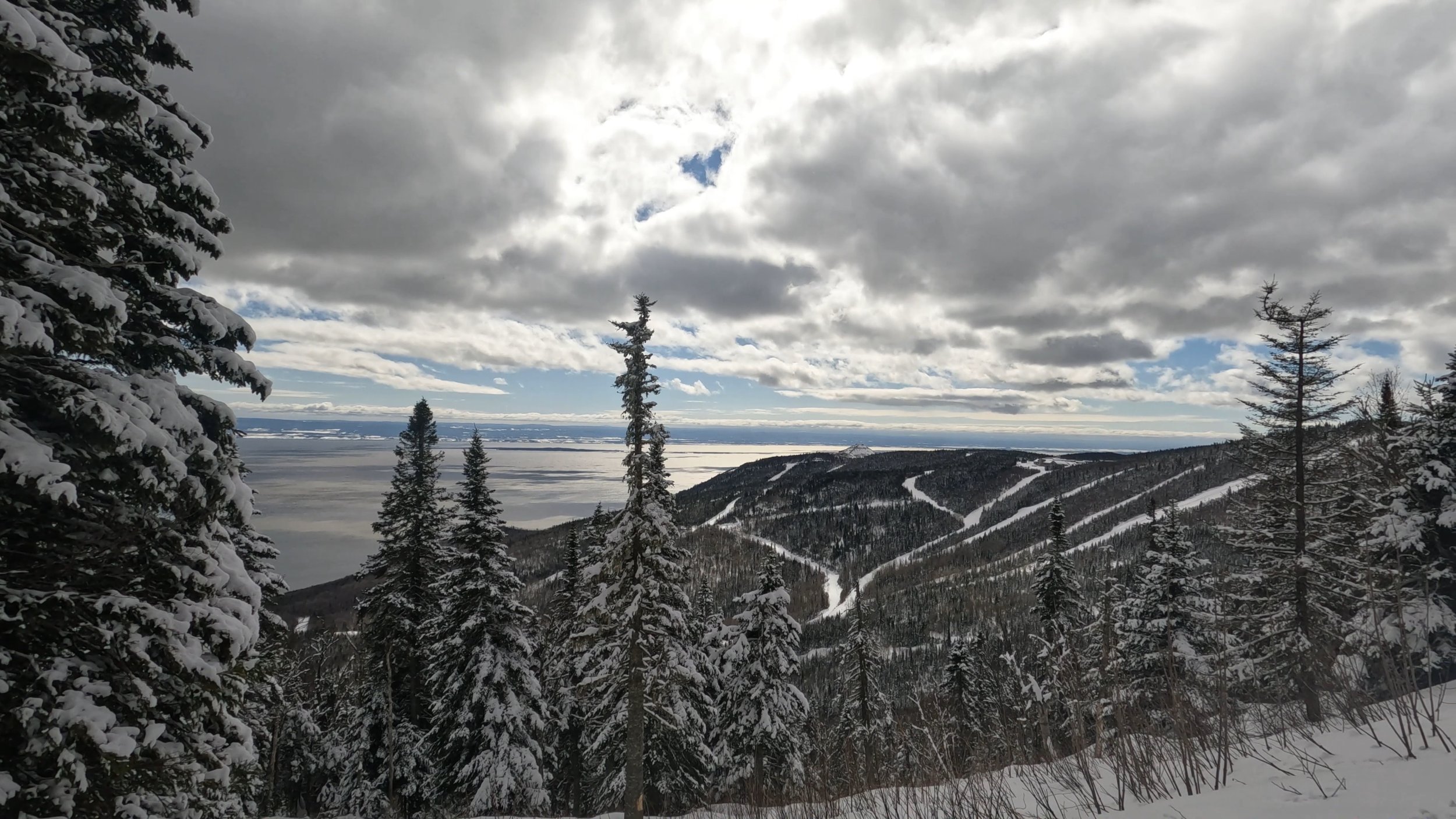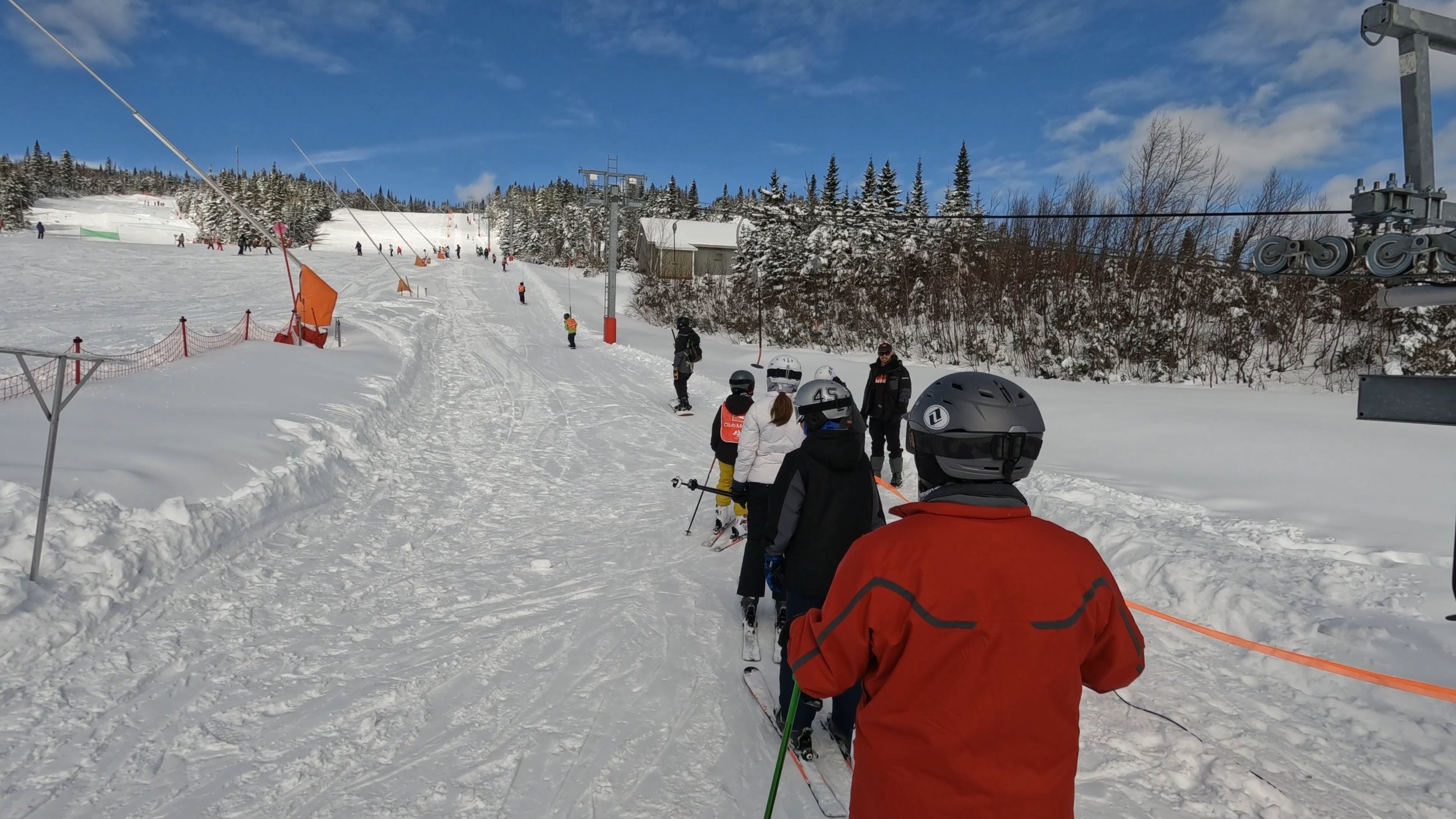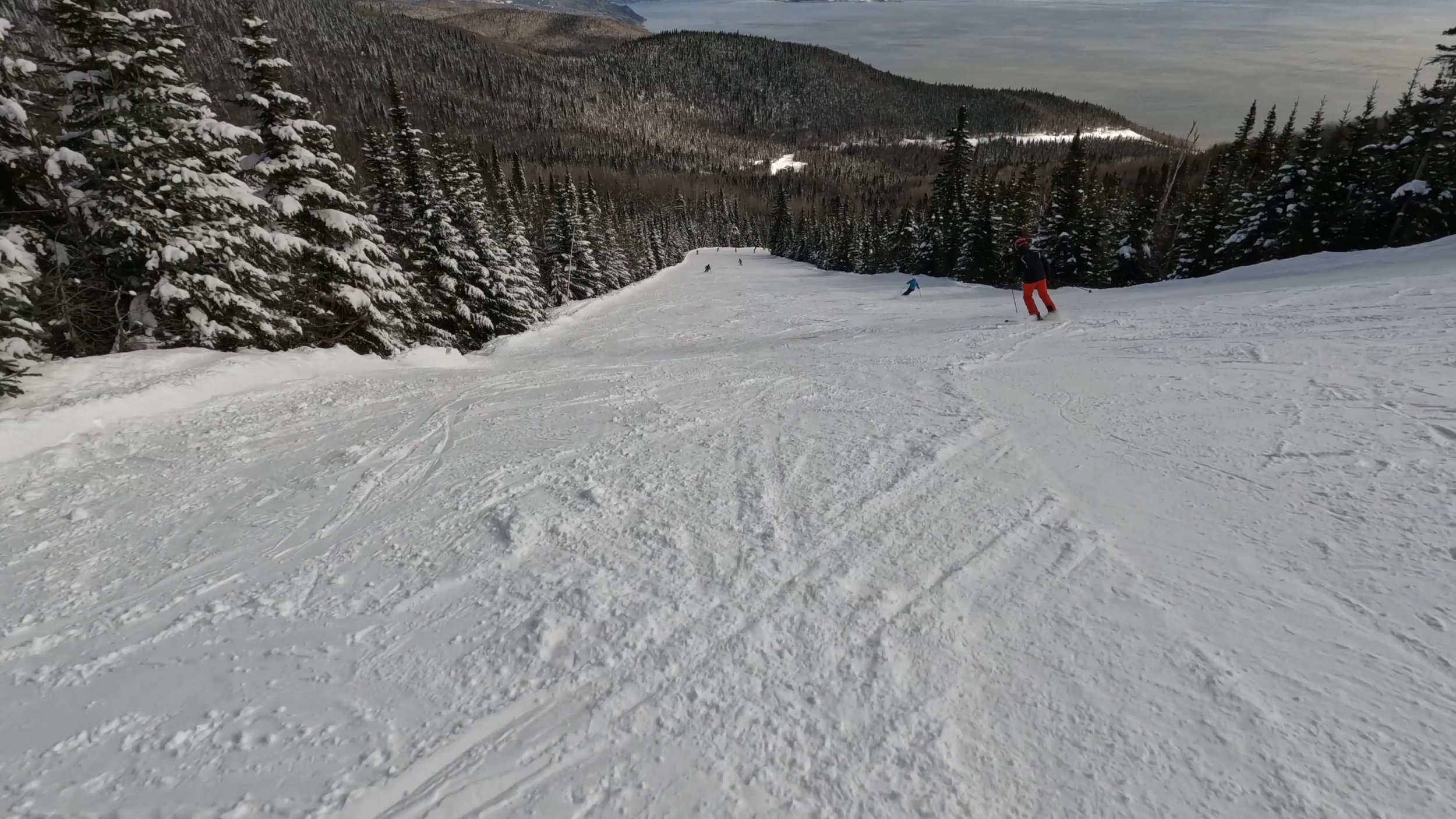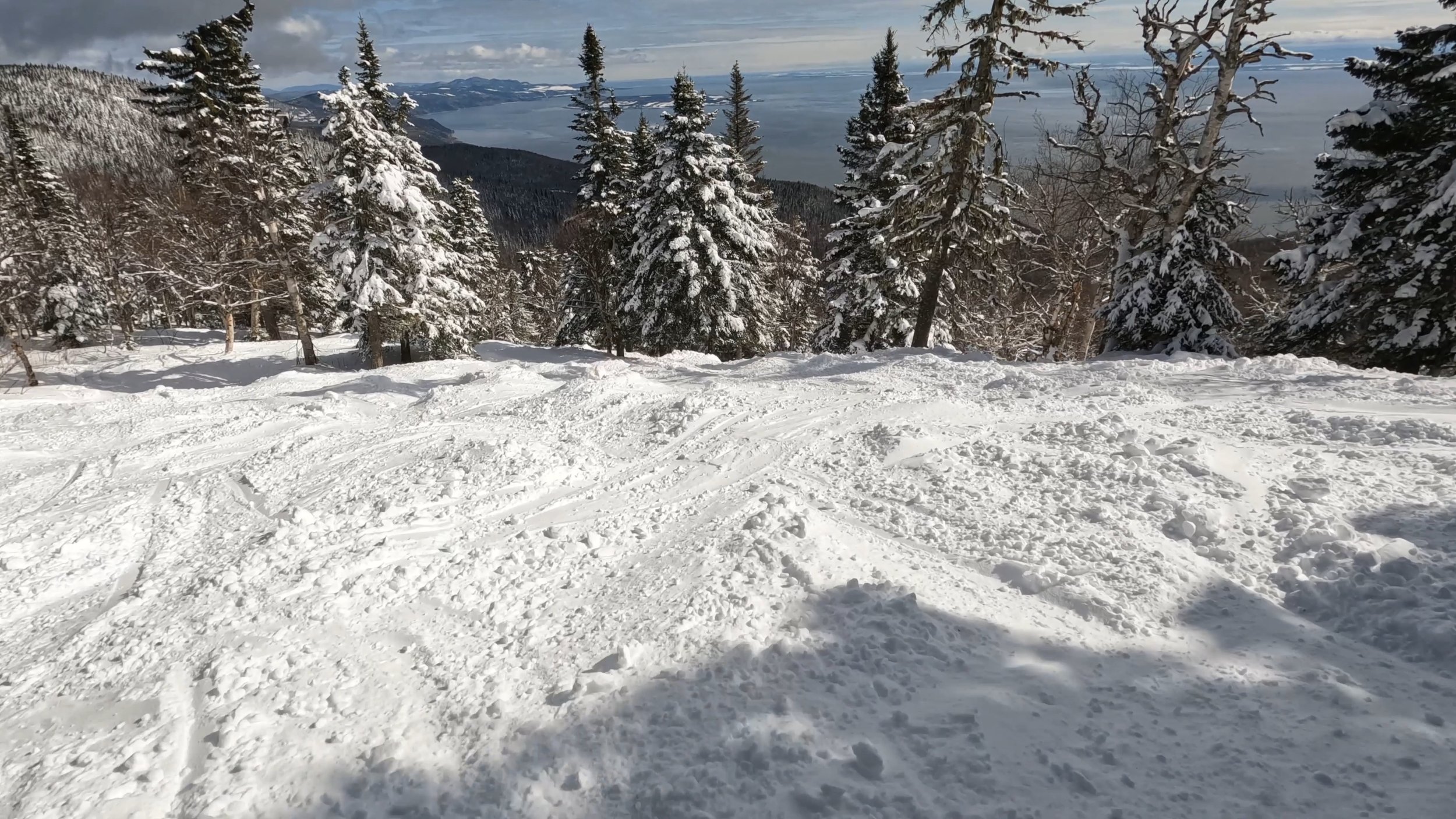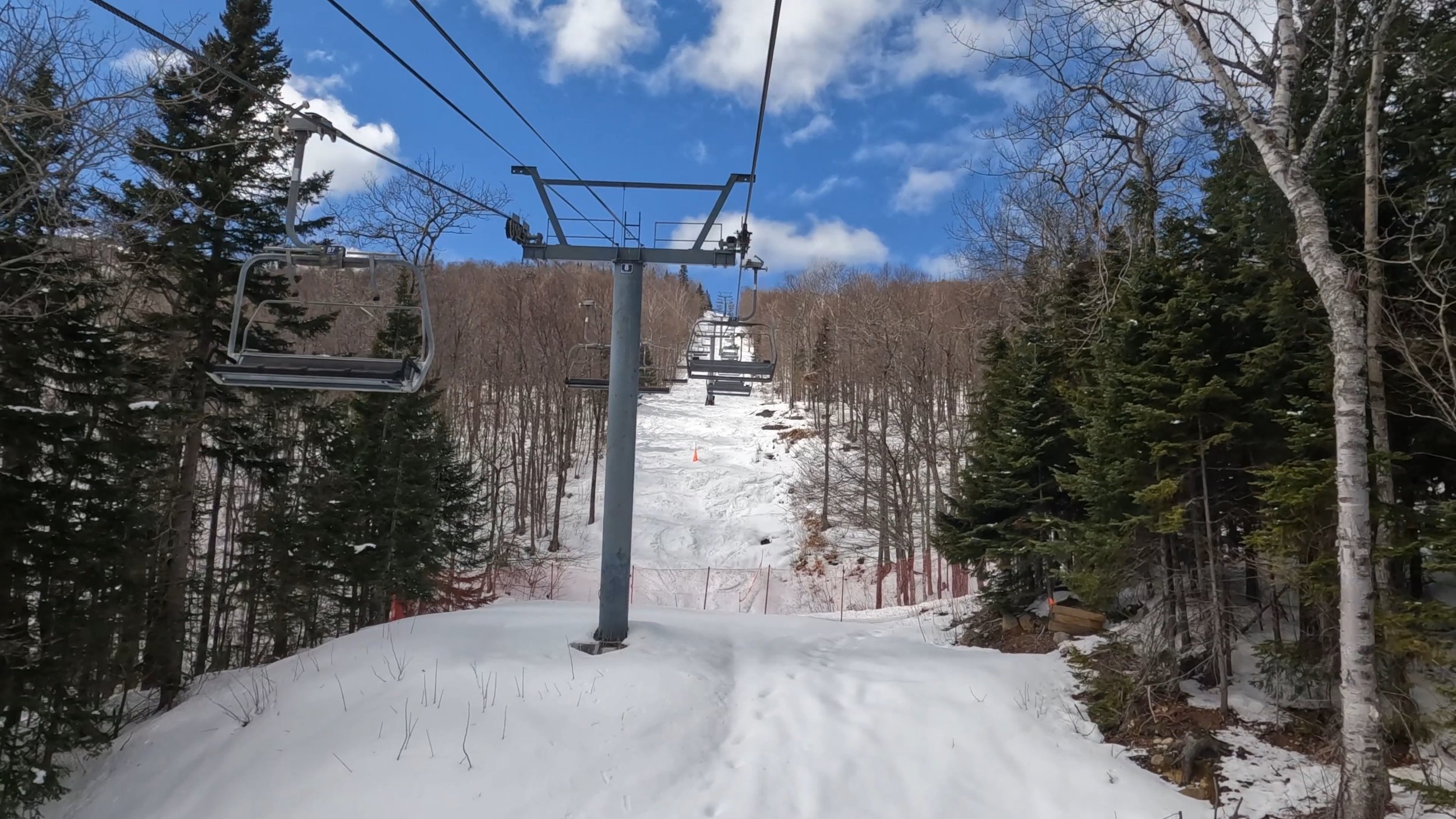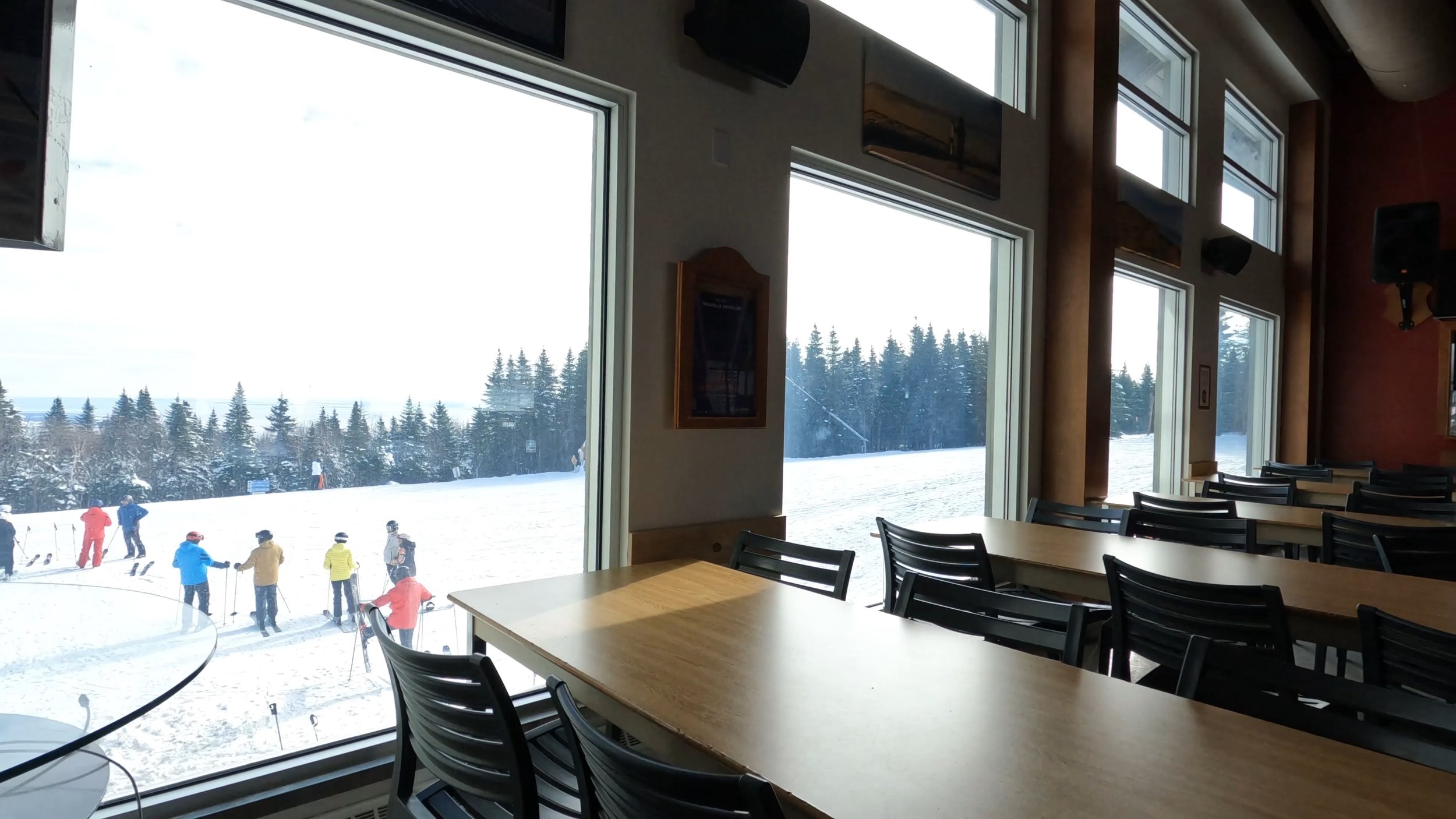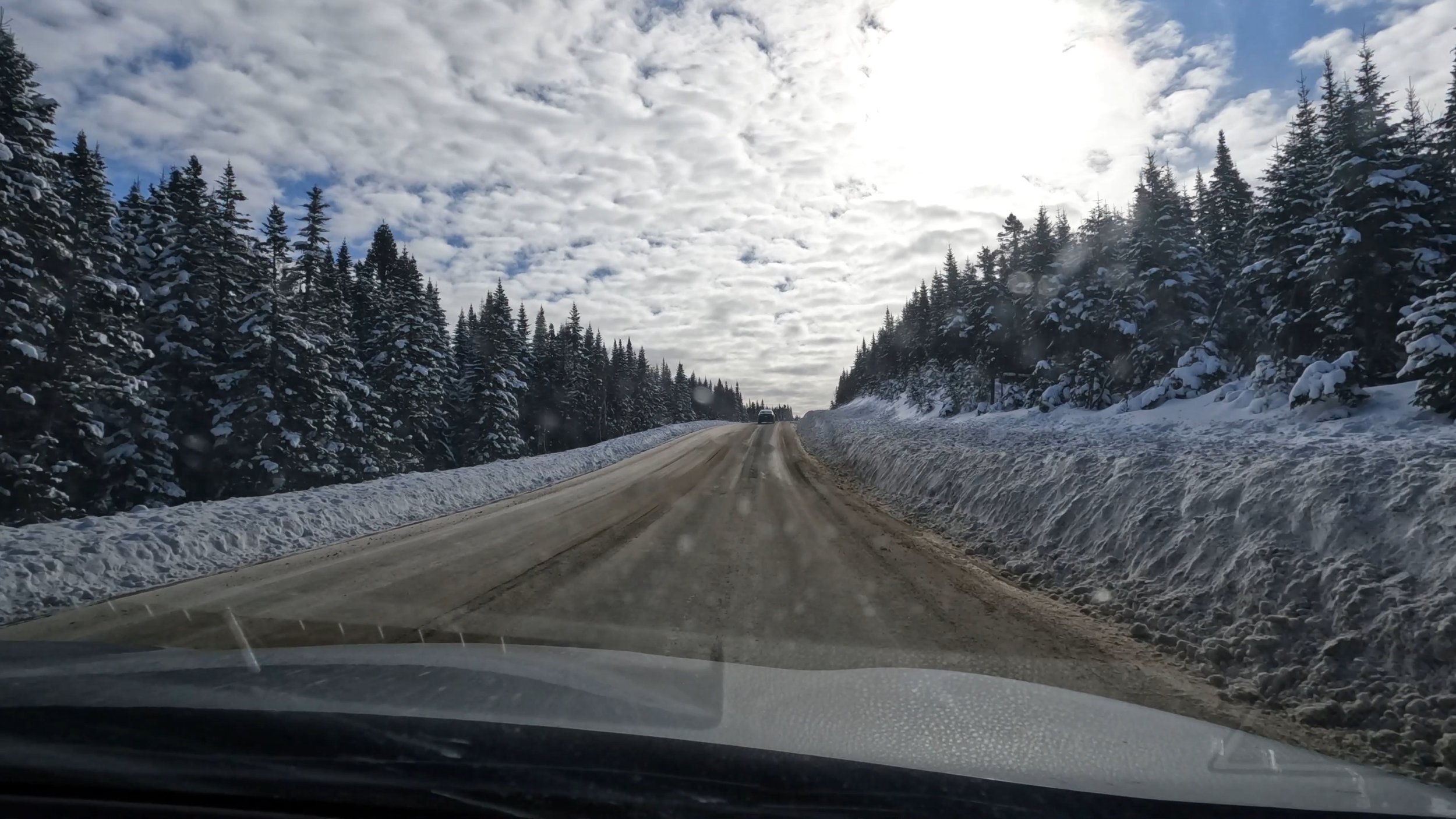Mountain Review: Le Massif de Charlevoix
MOUNTAIN SCORE
CATEGORY BREAKDOWN
See our criteria6
Snow:
5
Resiliency:
4
Size:
6
Terrain Diversity:
7
Challenge:
8
Lifts:
7
Crowd Flow:
6
Facilities:
7
Navigation:
10
Mountain Aesthetic:
GOOD TO KNOW
1-Day Ticket: $121-$166 CAD ($84-$116 USD)
Pass Affiliation: Mountain Collective
On-site Lodging: Yes
Après-ski: Limited
Nearest Cities: Quebec (1 hr), Montreal (3.5 hrs)
Recommended Ability Level:
+ Pros
Extraordinary footprint overlooking St. Lawrence River
Competitive vertical drop
Exceptional glade terrain
Reasonable crowds
High-speed lifts
– Cons
Much more difficult to reach than other Northeast ski resorts
Lower-mountain terrain reliability
Limited lodging
MOUNTAIN STATS
Lifts: 12
Trails: 53
Beginner: 15%
Intermediate: 30%
Advanced/Expert: 55%
Mountain Review
When you drive up to Quebec’s Le Massif, you know it’s something truly special. Boasting spectacular views, distinctive terrain, and one of the biggest footprints in the region, Le Massif de Charlevoix is possibly the East’s closest thing to a true North American destination experience.
Despite snow totals that pale to those of most western resorts, Le Massif’s one-of-a-kind topography makes for an experience that some might call travel-worthy in its own right. So how does Le Massif stack up as an overall package?
Le Massif is one of the most stunning ski resorts we’ve ever visited—and you can see it in all of its glory as soon as you unload your car.
Mountain Aesthetic
The first thing that stands out about Le Massif is its looks. With spectacular views overlooking the Saint Lawrence River, we’d argue Le Massif is one of the most beautiful ski resorts in the entirety of North America, if not the whole world. This isn’t something that any other resort East of the Mississippi can come close to embodying. Not only does a trip to Le Massif provide the surreal experience of seemingly skiing or riding into a body of water, but unlike certain other resorts with nearby lakes, the continuous movement of the river provides a one-of-a-kind backdrop that’s hard to truly appreciate unless you see it for yourself.
Aside from the tucked-away bunny hill by the Club Med, nowhere at the resort feels built-up or developed, and most guests will find their ski or ride experience to feel isolated and naturalistic. The D chair feels plucked straight out of an isolated terrain pod out West, with beautiful snowy alpine scenery and wide open, otherworldly glades that sometimes feel like your own private resort, with massive river views stretching out beyond you. For the adventurous, the 15 minute hike to the top of the unique hors-piste zone will give you a 2,500-foot-high panorama of the whole resort that’s truly breathtaking.
It’s also worth noting that Le Massif is a rare upside-down ski resort, with the main base area actually being at the top of the mountain, rather than the bottom. This means that you get to appreciate the amazing views in all their glory as soon as you strap on your skis or board.
Le Massif boasts a modestly-sized footprint for the East Coast on paper, but the resort also includes a sizable unpatrolled “hors-piste” sidecountry area.
Size and Terrain Layout
With a 406-acre skiable footprint within the official bounds of the resort, Le Massif de Charlevoix is a modestly-sized resort for the East Coast on paper. However, the resort calls home to an impressive 2,526-foot vertical drop, which is up there with the best on the East Coast. The resort also boasts a sizable ”hors-piste” area to the skiers’ left of the official boundary, with over 160 skiable acres of unpatrolled terrain available to explore. If inclusive of this off-piste terrain area, Le Massif offers a skiable footprint over 560 acres in size, putting it on the upper end of mountains east of the Mississippi.
Beginner Terrain
Beginner terrain at Le Massif isn’t exactly an outstanding experience, although there are some positives. The gondola, B chair, and D chair all service green-rated runs, but they are very limited in nature, with only one to two routes in most places, and they can get crowded. But while Le Massif’s easier runs are limited in quantity, the resort does offer top-to-bottom green terrain, making for the longest possible vertical descent on a beginner slope east of the Mississippi. For those who don’t want runs that long, guests can load back up the resort at mid-mountain via the D chair or gondola mid-station.
While Le Massif’s easier terrain is limited, the resort does offer the longest top-to-bottom beginner-level ski route on the East Coast.
Le Massif does have a few options for those who are truly first timers. At the base of the gondola, guests will find a well-sheltered bunny hill area. This zone overlooks the Club Med resort, which is an ideal location for those with the means looking for a ski-in, ski-out luxury beginner experience. This location is also highly sheltered, keeping beginners safe from higher speed traffic. But due to Le Massif’s inverted layout, most guests will begin their day near the summit—far from this lower beginner zone—making this learning area impractical for all but those staying at the Club Med.
However, near the summit lodge is a secondary bunny hill that’s even more sheltered. This high-elevation zone offers spectacular views and excellent snow preservation for a beginner zone. It also features a miniature progression terrain park for beginner and intermediate park enthusiasts looking to practice small jumps. This all being said, this zone comes with a significant drawback for less experienced skiers and riders: it’s served solely by a poma lift, a surface lift that many beginners find challenging and frustrating. At least skiers and riders in this zone can take comfort knowing that the surface lift is keeping them safe from the high winds which frequently occur at this high resort elevation.
Le Massif offers a decent selection of intermediate terrain, with the best slopes arguably accessible off Chair D.
Intermediate Terrain
Blues at Le Massif are comparable in design to the intermediate trails one would find at many destination resorts. Groomer skiing isn’t quite the expansive experience that one might find at some western resorts, but grooming operations are consistent and widespread enough across the resort's sizable footprint. The blue trails off Chair D are probably the best at the resort, as they sit in a high-up terrain pod that preserves good snow and faces less south than the rest of the mountain. Notably, some low-angle blue bump runs exist at Le Massif, a rarity among East Coast resorts. These runs are the perfect place for intermediates to experiment in ungroomed terrain with limited consequences for mistakes. Massif’s blue groomers are often empty and rip fast with lots of natural berms, which can be a lot of fun for those looking to ski or ride a bit more aggressively on lower-consequence terrain. In addition, some of the groomed black diamonds are plenty approachable for most upper-intermediate visitors.
TRAIL MAP
Advanced Terrain
Advanced terrain at Le Massif is among the best in the region, especially if you like glades. Unlike many resorts elsewhere in Quebec and Northern Vermont, unmarked glades at Le Massif are by and large too dense to ski without local knowledge. However, marked woods runs are widely present across the resort's footprint. These glades are cut to every level of desired density, with certain woods trails offering such a unique East Coast experience that they feel like you’re skiing in a different region entirely. Glades at Le Massif range from Colorado’s “glades are where there’s a tree sometimes” to New Hampshire’s “better have your pole plants on lock” level of technicality, but each are cut with an attention to detail that makes every run ski with flow and a good fall line that takes advantage of the natural movements of the terrain. You could spend all day trying different lines through the trees of a single terrain pod without ever getting bored.
Outside the glades, Le Massif’s fully cut trails also run the gamut of fairly steep groomers to nice mid-angle bump runs that should give advanced skiers a complete and satisfying experience. Black bump runs frequently sustain a long thigh-burning fall line, making for excellent endurance terrain.
Le Massif offers excellent advanced-level glade terrain, some of which is widely-spaced enough to offer the resort’s signature river views.
Expert Terrain
While not the toughest ski resort in the East, Le Massif is still a great choice for experts when conditions allow. Double-black-diamond runs all have pitches that are deserving of the rating, and skiers below expert level should take extreme caution when entering double-black-rated zones due to the exposure. Tree-defined trails of this level offer a combination of steep and protracted fall lines, making for some of the best cardio-busting ski runs one can find east of the Mississippi.
A particular highlight are the single and double black glades off Chair D, whose high elevation preserves natural snow extremely well even when it’s been a while since a storm, and each command a sustained gladed vertical almost all the way back down to the lift. Many of the glades off Chair B, such as La Derive and La Coursive, while tighter than the glades off Chair D, boast deceptively large footprints and fly under many visitors' radar despite their central location.
Le Massif offers some particularly long and demanding bump runs, putting a strain on one’s endurance.
Hors-Piste Terrain
But despite the quality of Le Massif’s inbounds lift served terrain, none of it can compare to the true expert’s wet dream — the “hors piste” terrain to the skiers’ left of the official mountain.
This zone is unpatrolled and requires some mild hiking to reach — no matter which gate you choose — so extreme caution is advised before entering this zone. However, this zone is maintained by the resort and features strong signage, so for most savvy visitors this terrain should be considered more inbounds than the lift-accessed backcountry at other resorts.
These zones, particularly the steep chutes marked Secteur 1 & 2 on the map, are some of the East Coast’s most extreme terrain offerings, boasting incredibly steep pitches including paths with airs over icefalls and between steep trees. Due to the nature of their access, difficulty, and sheer size, each of these zones can preserve snow for days after a storm with favorable weather, and on a powder day, they can easily offer fresh laps until your legs give out. For most expert visitors, the short 15-minute hike will likely be more than worth it, given how unmissable of an experience these zones provide.
Le Massif’s unpatrolled sidecountry “hors piste” terrain offers unique glades with little-touched snow.
Lower Mountain Elevation and Aspect
The one shortcoming of expert terrain at Le Massif is the mid and lower mountain’s elevation and aspect, particularly on the lookers’ left side under Chair C. This terrain, comprising the bulk of Le Massif’s double-black patrolled offerings and very nicely sitting in its own isolated terrain pod, faces south and gets brutally sun-cooked when it hasn’t snowed. The iconic La Charlevoix trail, which is so wide and feature-riddled that it's better considered a freeride zone than a trail, is particularly weather susceptible and difficult to access due to its location, with either a high traverse or sidestep (depending on which gate is open) above Chair C required to get there, and faces a very southerly aspect on a ridge with almost no trees to shelter its snow.
Still though, Le Massif does have an accommodation for the issue of its near-sea-level elevation in lower-mountain areas. A convenient mid-load station on Chair C picks up skiers and riders halfway up the resort, allowing guests in this terrain pod to skip the long runout through slushy snow which often plagues the bottom third of the resort.
RECOMMENDED SKIS FOR LE MASSIF DE CHARLEVOIX
NOTE: We may receive a small affiliate commission if you click on the below links. All products listed below are unisex.
Recommended all-mountain ski
Recommended carving ski
Recommended glade ski
Recommended expert/touring ski
Snow Quality and Resiliency
Speaking of conditions, despite its quite northerly location, Le Massif’s annual snowfall falls short of most western destinations and even some East Coast competitors. In addition, much of the terrain faces south, and many lower elevation zones are vulnerable to melt-outs when it hasn’t recently snowed.
However, Le Massif’s tall footprint means snow preservation up high is still quite good for the region, particularly in expert zones that take far longer to ski out than one would expect at a resort of this caliber. These zones are easy to lap thanks to an intuitive lift layout, meaning it's easy for savvy guests to chase good conditions somewhere at the resort as long as the weather isn’t truly terrible. In addition, Le Massif’s northern location right on the St. Lawrence River means it can catch major storms that miss everywhere else in the east.
Snowmaking exists in most key resort areas, and grooming is employed to keep even the most vulnerable lower-mountain areas skiable. However, since the resort bottoms out near-sea level and faces south, spring-like conditions and bare spots are commonplace across the bottom third of the resort throughout the entire winter.
Le Massif’s lower mountain areas face south and sit almost at sea level, making for so-so conditions throughout the winter season.
Lifts
Le Massif has an impressive lift system for the East. Almost every lift at the resort is modern and high speed, with few seeing significant lift lines outside of peak periods. The main drawback is the variability of low elevation terrain making for a sluggish runout for those looking to lap top-to-bottom on the B chair and gondola, but this is avoidable with the mid-load stations on the C chair and gondola. In addition, the summit poma is a somewhat difficult lift for the beginners who are served by this terrain pod, but the tradeoff is wind-shelter for the most wind-exposed zone of the resort.
It’s worth reiterating that the hors-piste sections of Le Massif, which comprise over 160 skiable acres, are not directly lift served and require some hiking to reach.
Le Massif’s combination of fast lifts and modest crowds makes for quick laps versus other Northeast ski resorts.
Crowd Flow
For a major East Coast destination resort, Le Massif rarely sees serious crowding comparable to major resorts south of the border. An expansive and modern lift fleet placed sensibly to the fall lines makes it easy to lap most terrain zones, with minimal traversing required when every lift is running. The resort limits lift ticket sales to ensure that crowds are never too terrible.
Lines can sometimes build up at the gondola base and summit poma, but on the average day most guests will rarely be waiting longer than 5 minutes for a lift, with midweek visitors regularly skiing straight on to the chair even during midwinter months.
Le Massif’s biggest crowd flow issue arguably has to do with its lower mountain. Several trails converge into the same lower-mountain runs near the bottom, which leads to congestion, especially on the green runs down there. This can be particularly annoying on weekends or holidays.
Le Massif offers strong signage across its footprint, a lot of which happens to be in quite picturesque places.
Navigation
But at least Le Massif’s chokepoints are fairly straightforward to get acquainted with thanks to a generally-easy-to-figure-out mountain layout. Signage is abundant and thorough across the resort’s footprint, and all resort areas filter down to the main base aside from a few trails around the base of the gondola. From the main base, Chair B takes you straight up to the summit lodge, so it’s never difficult to find your way back to your car despite the resort’s inverted layout — as long as you aren’t caught at the base when the resort closes. Even in the hors-piste zone, signage is present at every major junction area, making it hard to get lost despite this area’s extreme isolation.
However, Le Massif occasionally requires some traversing to get between terrain zones, particularly getting to the lookers’ left terrain when the C chair isn’t running. In addition, the resort’s 3-dimensionality makes the sizes of some areas difficult to interpret from the map, leading to some runs feeling way longer than they might appear on paper.
RECOMMENDED SNOWBOARDS FOR LE MASSIF DE CHARLEVOIX
NOTE: We may receive a small affiliate commission if you click on the below links. All products listed below are unisex.
Recommended intermediate board
Recommended advanced board
Recommended expert board
Recommended touring board
On-Mountain Facilities
The lodges at Le Massif aren’t anything truly upscale, but they’re clean and placed conveniently. The resort offers two main lodges — one at the summit, and one at the base — and thanks to the mountain’s layout, it’s never too difficult to find somewhere to stop in outside of the hors-piste.
The summit lodge boasts incredible views and fewer crowds than the base lodge, making it the best option for most visitors to stop for a meal. Plus, with the resort’s inverted layout, this summit lodge will be most visitors' first stop. Both lodges are clean and serve their purpose, with satisfactory lodge food that, as with most Quebec resorts, is a great deal for those coming from the US. The base lodge also features a creperie, which is a must-visit. Guests can also stop in at the fancier Camp Boule restaurant at the top of Chair D.
Le Massif offers two main lodges—one at the summit and one at the base—as well as a fancier restaurant at the top of Chair D.
Getting There and Parking
Le Massif is likely the most northern resort that will ever be on the radar of a typical East Coast skier. It’s a very long drive from most US metro areas, with the resort sitting approximately 7 hours from Boston and a whopping 9 hours from New York. It’s even a pretty long commitment for those located in Montreal, with the drive from that city taking about three-and-a-half hours.
Those who are willing to fly will find the resort easily accessible from Quebec City, but at that point, many vacationers will probably just prefer to go out west.
Parking is mainly located at the top and is plenty expansive for the low crowds typical of a Quebec resort, and smaller lots are also available at the base area for those staying in the nearby town of Le Massif.
Le Massif is a very long drive from most major Northeast cities.
Lodging and Après-Ski
Le Massif’s remote location means there’s little onsite lodging aside from the extremely upscale Club-Med. However the nearby town of Mont-Sainte-Anne, sitting a convenient 20-30 minutes from the resort, features surprisingly affordable lodging options, as well as plenty of great local restaurants to stop in for a bite. It’s hardly a party town for those looking for nightlife, but for those willing to drive, Quebec City is a short trip from the resort with a much larger social scene.
Le Massif isn’t perfect, but its positive traits make it by far the best overall ski resort we’ve ever visited in the East.
Verdict
So Le Massif de Charlevoix isn’t the biggest or most consistent ski resort snow-wise in the East. But this river-adjacent destination offers a magical experience unlike anything else within thousands of miles of it. From the low crowds and untracked expert lines to its truly otherworldly aesthetics, Le Massif is unlikely to disappoint those willing to put in the drive to get there.
The real problem for Le Massif is its remoteness. Yes, many folks will find it a lot more unique than the best resorts in Vermont, Maine, and other parts of Quebec, but it’s not as good as a typical destination ski resort in Colorado or Utah. Ultimately, besides those who live in Quebec City or northern New Hampshire or Maine, Le Massif might not be quite as appealing of a choice as hopping on a plane and going somewhere bigger and more snow-sure.
Pricing
While more expensive than most other resorts in Quebec, Le Massif is a solid deal for those used to US destination single day prices. Adult tickets range from $121-$166 CAD, or around $84-$116 USD with today’s exchange rates. This is well short of the over $200 USD price tag of many competing resorts stateside, with both half-day tickets and 4-day bundles available for those looking for a deal. And, for families with younger children, guests 6 and under ski free.
Le Massif is also a member of the Mountain Collective Pass, with two days of access any time during the winter season.








